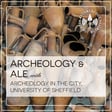
A People's History of Sheffield from the French Revolution to Chartism with Matthew Roberts - Ep 43
Archaeology & Ale is a monthly series of talks presented by Archaeology in the City, part of the University of Sheffield Archaeology Department’s outreach programme. This month we are proud to host Matthew Roberts from Sheffield Hallam University speaking on "A People's History of Sheffield from the French Revolution to Chartism". This talk took place on Tuesday, November 23rd, 2021, online via Google Meets.
Sheffield has a rich tradition of ‘history from below’, in the sense of a long established assertive and proud group of working people who created a rich occupational, social and political culture. From the time of the French Revolution in the 1790s through to the 1850s and beyond, working people increasingly fought for recognition, dignity, protection in the workplace and their rights of citizens. At the centre of these struggles were Sheffield’s metal workers, the cutlers and ‘little mesters’, as well as women and not just as wives but in their own right. What was life like for the working classes of Sheffield during this period? What changes and continuities marked their lives? Why did Sheffield become a centre of radical politics? These are some of the questions we’ll explore in this talk.
Matthew Roberts from Sheffield Hallam University
Matthew Roberts is Associate Professor in Modern British History at Sheffield Hallam University in the UK. He is an historian of nineteenth-century Britain and the Anglophone Atlantic World, and works mainly on the history of popular politics and protest, the visual and material culture of politics, and more recently the history of emotions. His book Chartism, Commemoration and the Cult of the Radical Hero was published by Routledge in 2020, and is now available in paperback.
For more information about Archaeology in the City’s events and opportunities to get involved, please email archaeologyinthecity@sheffield.ac.uk or visit our website at archinthecity.wordpress.com. You can also find us on Twitter (@archinthecity), Instagram (@archaeointhecity), or Facebook (@archinthecity)
ArchPodNet- APN Website: https://www.archpodnet.com
- APN on Facebook: https://www.facebook.com/archpodnet
- APN on Twitter: https://www.twitter.com/archpodnet
- APN on Instagram: https://www.instagram.com/archpodnet
- Tee Public Store
- APN Website: https://www.archpodnet.com
- APN on Facebook: https://www.facebook.com/archpodnet
- APN on Twitter: https://www.twitter.com/archpodnet
- APN on Instagram: https://www.instagram.com/archpodnet
- Tee Public Store
